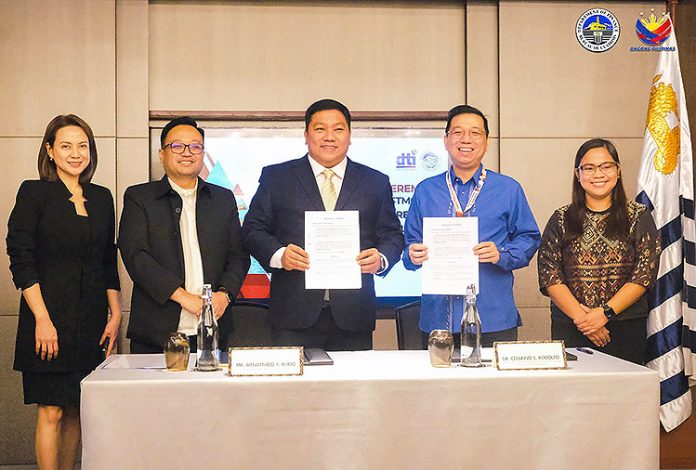
-
The Bureau of Customs and Department of Trade and Industry-Strategic Trade Management Office signed a MOA on the facilitation of strategic trade
-
The MOA is a step toward strengthening implementation of Republic Act No. 10697, also known as the Strategic Trade Management Act
-
Key features of the MOA include provisions for capacity-building support for BOC to enhance its knowledge of strategic goods and foster enhanced cooperation between BOC and STMO
The Bureau of Customs (BOC) and Department of Trade and Industry-Strategic Trade Management Office (DTI-STMO) signed on September 4 a memorandum of agreement on the facilitation of strategic trade.
The MOA is a step toward strengthening implementation of Republic Act No. 10697, also known as the Strategic Trade Management Act (STMA), BOC said in a statement.
The agreement signifies commitment to establishing robust and effective strategic trade controls in the country, aligning with United Nations (UN) Security Council Resolution No. 1540, BOC added.
The UN resolution “imposes binding obligations on all states to adopt legislation to prevent the proliferation of nuclear, chemical and biological weapons, and their means of delivery, and establish appropriate domestic controls over related materials to prevent their illicit trafficking.”
Strategic goods are products that, due to security reasons or international agreements, are considered to be of such military importance that their export is either subject to specific conditions or prohibited altogether.
BOC said key features of the MOA include provisions for capacity-building support for BOC to enhance its knowledge of strategic goods and foster enhanced cooperation between BOC and STMO. This collaboration encompasses data sharing, risk management, trade facilitation, and monitoring collective efforts.
Customs commissioner Bienvenido Rubio said the agreement aligns with the core mandates of the BOC, which are strengthening border control, enhancing trade facilitation, and improving lawful revenue collection. He added it paves the way for a future in which strategic trade control processes expedite clearances, reduce transaction time and costs, and maintain effective levels of strategic trade control.
Prior to the September 4 MOA signing, BOC, STMO and other investment promotion agencies in December 2022 also signed a MOA to facilitate the trade of strategic goods.
Signed in 2016, STMA aims to regulate the export, import, transit and transshipment, re-export and reassignment of strategic goods, software and technology and the provision of related services to prevent weapons of mass destruction (WMD) from proliferating.
The law established STMO to serve as the executive and technical agency of the government in establishing the systems for managing the trade of strategic goods pursuant to STMA.
STMO is enforcing a phased implementation of the STMA and has started with exports. Last January 1, STMO began implementing the requirement for authorization prior to the export of strategic goods.
RELATED READ: Strategic goods export authorization required from 2023
STMO will gradually cover other types of shipments, including transit/transshipment, re-export/re-assignment, related services (e.g. transporting, brokering), and imports.
When STMO started implementing and accepting export authorization applications in July 2020 until end-2020, the export value for strategic goods amounted to US$3.6 million.
The following year, there was a big jump when traded strategic goods were valued at $4.5 billion.
The figure remained the same in 2022.
Information systems formed 98% of strategic goods exports in 2021, while semiconductors and integrated circuits accounted for the remaining 2%. Also, there were $650,000 in new investments in the intangible technology transfer in 2021.
In February 2023, STMO launched the e-Licensing platform, which facilitates the issuance of certificates to industry stakeholders applying for the cross-border transfer of strategic goods.
RELATED READ: DTI inaugurates digital platform for strategic trade-related services




